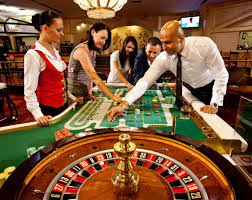There is an enormous interest in online gambling from all around the big African continent. Although gambling remains illegal in some states such as Somalia, there are many others states where gambling is perfectly legal. According to the Quran, gambling is a sin, so you can find similar bans in other Muslim-majority countries.
Egypt is an interesting example of a mixture between legality and illegality though. While Egyptians themselves can’t gamble (except for participating in the state lottery), foreigners are free to engage in it and the North African state accommodates them with lavish casinos.
Our focus, however, is online gambling. The last decade has seen the African online gambling industry expanding with the speed of light. In this article, we will tell you more about how that happened and what the current state of online gambling markets is, and what’s expected to happen in the future.
A Lucrative Market
There are many factors which led to the expansion of the online gambling industry of Africa. Perhaps the most significant one is the growth of various state economies on the continent. Many African countries experience unprecedent levels of economic success, which allow for new industries to pop up. There’s also a shared enthusiasm for creating new businesses and big populations that can sustain them.
A lot of African entrepreneurs are riding this wave of success, but they’re not the only ones. The exponential and sustained growth of African economies also caught the eye of foreign investors who now view the African market as stable to invest in. Online gambling operators are no different.
This is especially true for foreign companies with platforms offering sports betting since sports betting is the most popular form of gambling in Africa. Africans love their football (who can blame them) and they apparently love betting on football as well. Most of the punters are young people, which is good news for online gambling companies, because 35% of those living in Africa (or 420 million people) are between the ages of 15 and 35.
Another reason why investors are currently pursuing projects in Africa is due to the Covid-19 pandemic. The African continent, despite its enormous size, is the least affected by the virus. Thus, foreign investors are taking on a lesser risk by investing in African industries, which have suffered and continue to suffer far fewer losses than their European and Asian counterparts.
A few African countries took note of this and used the pandemic to regulate gambling. Ghana, for example, legalized sports betting, while Tanzania expanded its gambling market by adding virtual sports betting to it. In addition, Kenya lowered its betting tax to 7.5% to attract operators after a heated debate surrounding gambling taxation. We suspect other countries would follow suit once they see how gambling enriches their neighbors.
And the Winner Is…
In this section, we will take a look at African countries, which have greatly benefited by allowing or showing inclination to allow online gambling within their borders.
Malawi
Malawi used to be the outlier in terms of gambling. The Southeast African country has had a booming gambling industry for decades now. In 1996, Malawi created the Malawi Gaming Board, which kickstarted the process of introducing different forms of gambling to its citizens.
Now, the country is in the process of expanding its industry even more. Since the internet wasn’t what it is now at the time when Malawi made gambling legal, legislators are looking for ways to regulate it. Currently, online gambling is not regulated, so it’s technically not illegal. The Malawian government, however, has expressed support for outright legalizing online gambling.
Nigeria
Nigeria is the most populous country in Africa, so it’s no surprise that it has one of the biggest gambling industries. According to reports, as many as 60% of Nigerians (or 120 million) bet every year. Online gambling is legal and regulated in the country. Moreover, online gambling is not location-based meaning that Nigerian players can bet at both local and foreign online casinos.
South Africa
The Southern-most country on the continent accounts for 50% of Africa’s gambling revenue. Yes, you heard that right! Interestingly, South Africa formally banned gambling all the way back in the 1600’s, but it changed course in 1994 by overruling the ban, which was sealed two years later by adopting the National Gambling Act. Following laws also relaxed gambling regulations.
However, the country still has to relax some of its online gambling regulations. The current situation is murky in terms of online gambling. While an act from 2008 was meant to legalize online gambling, it was never ratified, which left players and operators hanging. In 2010, the government also banned South Africans from playing in overseas online casinos.
Although it’s currently only legal to bet on sports online, South Africa might be inclined to change that soon. A few research papers on local gambling have shown its exponential growth, while gambling lobbyists give examples with other African countries that have legal and successful online gambling industries.








 Looking at the online performance of the operators, Ladbrokes dipped £23.8m down compared to last year and for William Hills that is £126.5m (representing 29% drop in profit). Let’s analyse the results for each operator and try draw some conclusions.
Looking at the online performance of the operators, Ladbrokes dipped £23.8m down compared to last year and for William Hills that is £126.5m (representing 29% drop in profit). Let’s analyse the results for each operator and try draw some conclusions.
 Certainly not everyone is happy, many players fear that the merger between Coral and Ladbrokes will lead to an
Certainly not everyone is happy, many players fear that the merger between Coral and Ladbrokes will lead to an 

 As soon as they found out about what had been going on, the management immediately sacked the two employees before filing charges against them. Their identities haven’t been confirmed, as the investigators have left the matter largely in the hands of McDonald’s, who appear to have decided not to press charges. Had they opted to go to court, the employees would’ve faced hefty fines or even jail time if (or rather, when) they were found guilty. “It was pretty stupid. They were always going to get caught once they started losing”, an employee of McDonald’s and a (now former) colleague of the perpetrators said. Apparently everyone at the restaurant knew what the two had been doing, claiming that such mishandling of money by the two employees “had been happening regularly”. The firing of the employees was confirmed by a McDonald’s spokesperson, who also stated that an internal investigation was currently underway to determine just how much money was missing (the amount is speculated to be in the thousands, but that has yet to be confirmed).
As soon as they found out about what had been going on, the management immediately sacked the two employees before filing charges against them. Their identities haven’t been confirmed, as the investigators have left the matter largely in the hands of McDonald’s, who appear to have decided not to press charges. Had they opted to go to court, the employees would’ve faced hefty fines or even jail time if (or rather, when) they were found guilty. “It was pretty stupid. They were always going to get caught once they started losing”, an employee of McDonald’s and a (now former) colleague of the perpetrators said. Apparently everyone at the restaurant knew what the two had been doing, claiming that such mishandling of money by the two employees “had been happening regularly”. The firing of the employees was confirmed by a McDonald’s spokesperson, who also stated that an internal investigation was currently underway to determine just how much money was missing (the amount is speculated to be in the thousands, but that has yet to be confirmed).
 Philip Yea, chairman of Bwin, shared his difficulty with choosing between the bidders, implying that it was really a question of potential long-term benefits from 888 and guaranteed short-term ones from GVC. “It really has been a question of balancing some very fine judgments at the margin”, he explained. It’s important to note that the modern version of Bwin was already created from a merger between the old version and Party Gaming, so the management staff have experience with this sort of thing and we should presume that they were fully aware of all the implications and complications picking GVC over 888 would have in the next 5 to 10 years.
Philip Yea, chairman of Bwin, shared his difficulty with choosing between the bidders, implying that it was really a question of potential long-term benefits from 888 and guaranteed short-term ones from GVC. “It really has been a question of balancing some very fine judgments at the margin”, he explained. It’s important to note that the modern version of Bwin was already created from a merger between the old version and Party Gaming, so the management staff have experience with this sort of thing and we should presume that they were fully aware of all the implications and complications picking GVC over 888 would have in the next 5 to 10 years. 
